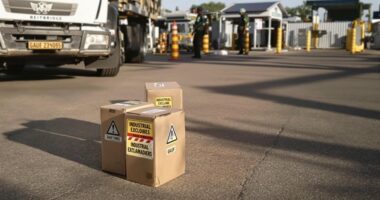South Africa’s government is hunting for alternatives after its proposed 1% VAT increase faced fierce opposition. The Democratic Alliance filed a court case against the hike, which narrowly passed parliament by 192-182 votes. The standoff threatens the stability of the Government of National Unity coalition. Alternatives include selling port concessions, modernizing the tax system, and targeting illicit trade. Treasury now has 30 days to find other revenue sources as the nation’s debt concerns grow.
South Africa’s government scrambles to find new revenue options as its proposed 1% value-added tax (VAT) increase faces stiff opposition. The tax hike, planned to roll out over two years, has met fierce resistance from the Democratic Alliance (DA), a key partner in the African National Congress (ANC) coalition government. This standoff threatens the stability of the recently formed Government of National Unity (GNU).
The budget barely passed parliament with a narrow margin of 192-182 votes. This close result highlights how fragile the coalition government truly is. The ANC now has a difficult task ahead as Treasury faces a 30-day deadline to find alternative revenue sources that can replace the R13.5 billion the VAT increase would generate.
“We can’t burden ordinary citizens with more taxes,” said a DA spokesperson. The party has gone beyond verbal opposition and filed a court case to block the VAT hike, claiming the budget process was unconstitutional. Critics argue that VAT disproportionately affects lower-income households since they spend a larger portion of their income on basic goods.
Several alternatives have emerged as potential solutions to the revenue shortfall. One proposal involves selling port concessions, which could generate significant funds without directly increasing taxes on citizens. Another approach focuses on modernizing the tax system through digitization and artificial intelligence tools that can better track tax evasion.
The South African Revenue Service (SARS) believes its Revenue Recovery Programme could recover between R20 billion and R50 billion annually if given proper funding. This would far exceed the R13.5 billion gap created by abandoning the VAT hike. Additionally, targeted enforcement against illicit trade could reduce revenue leakage from the economy.
ActionSA, another coalition partner, has demanded inflation adjustments to personal income tax brackets to prevent “bracket creep” – a situation where inflation pushes taxpayers into higher tax brackets without actual income growth. This would make the tax system more progressive rather than relying on regressive consumption taxes. ActionSA has taken a leading role by successfully amending the committee report to protect ordinary South Africans from unfair tax increases.
Cost-cutting measures across government departments have also been proposed, but they face implementation challenges and would require systemic spending reviews to be effective. Possible options include implementing across-the-board cuts or targeting specific programs like Early Childhood Development funding.
The Treasury must balance these options carefully, as South Africa’s national debt is projected to reach 75.5% of GDP. The rand remains volatile due to this fiscal uncertainty. Business leaders have expressed concern that whichever solution emerges could impact investment if it creates an unfavorable economic environment.
As the 30-day deadline approaches, South Africa’s financial future hangs in the balance while government officials work to find a compromise that can satisfy coalition partners without derailing economic stability.
Conclusion
South Africa’s government is now searching for other ways to boost revenue as citizens push back against the VAT increase. Officials are considering wealth taxes and corporate tax adjustments instead. The finance ministry hasn’t announced final decisions yet, but they’re listening to public concerns. Economic experts say these alternative approaches might help balance the budget while protecting low-income households from higher living costs.








